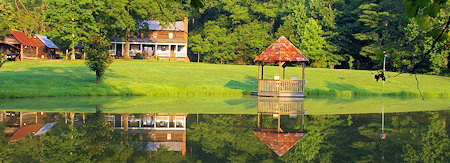![]() By A. Lenard, GMC Magazine, Spring 2008
By A. Lenard, GMC Magazine, Spring 2008
In a time when people conscientiously recycle their trash, replace lightbulbs with more efficient ones and excitedly await a new era of alternative fuel vehicles, it’s no surprise that they are turning to responsible vacation travel. Ecotourism is one of the fastest-growing segments of the travel industry. In fact, The International Ecotourism Society (TIES) estimates that upwards of 2.4 million U.S. travelers will take an eco-trip this year.
What is ecotourism? Think of it as a travel experience that benefits the environment, boosts the economy or well-being of the host community, and provides the traveler with an educational and enjoyable trip.
While many eco-friendly destinations are found outside the United States — in places like Costa Rica, Thailand and South Africa — there are a number of tour operators and resorts offering an authentic experience with nature in this country.
“Ecotourism experiences are attracting more people than ever because travelers tend to feel a personal connection during their trip and continue to seek out those types of experiences again and again,” says Ayako Ezaki, director of communication for TIES.
We’ve highlighted a few of these environmentally friendly destinations just waiting to be discovered.
Destination: Blue Ridge Mountains
The Cottages at Spring House Farm
Marion, North Carolina
The sprawling 92 acres of The Cottages at Spring House Farm offer so much privacy that guests might not see another person during their stay if they prefer it that way. That’s because owners Arthur and Zee Anne Campbell have taken great care to design this secluded five-cottage retreat for maximum enjoyment of the awe-inspiring natural setting. Set in the foothills of the Blue Ridge Mountains outside Asheville, N.C., The Cottages at Spring House Farm has been meticulously groomed and built to preserve its original state as much as possible.
Arthur Campbell, a former airline pilot, had grown tired of crowded spaces and fast-paced life. He longed for the great outdoors that he experienced growing up on a soybean plantation, which led to the purchase of the property several years ago. He and his family set to work restoring an 1826 home on the farm to live in, while making plans to create a wildlife sanctuary. Using timber and stone from the land, the Campbells built unique log cabins that offered privacy and an up-close view of the wilderness. Many of the roads on the property were designed from existing old logging roads around the hardwoods. All power lines have been buried underground to keep a clear view of the surroundings. And the Campbells installed 6,000 feet of waterlines to bring running water to the cottages from a single aquifer they dug themselves.
Open year-round, guests can embark on a mountainous hiking trail, catch-and-release fish for trout and bass or brim in one of the three stocked ponds, canoe or paddle in a pond, relax in a private on-deck hot tub or picnic under one of the hand-built gazebos. Visitors will find many amenities in their cottage, including a stocked pantry with farm fresh brown eggs, locally produced honey and bread. Guests can indulge themselves with spa services, including a massage on the deck of their cottage, or explore the area’s diverse attractions. Nearby resorts such as Chimney Rock and Lake Lure offer several water activities and scenic tours. There’s plenty of wildlife to observe at The Cottages at Spring Hill Farm, from turkeys and deer to bullfrogs and birds. And there’s a clear starry sky perfect for gazing almost every night.
“When guests spend time here, it’s like flipping a switch,” Arthur Campbell says. “It’s almost like an awakening. Instead of a taking, taking, taking mind-set, it inspires them to think about giving some back.” The Cottages at Spring House Farm was the first U.S. member of EcoClub, an international ecotourism organization, and it continues to stay involved with environmental groups. Visit www.springhousefarm.com for additional information, including packages and amenities. Reservations can also be made by calling 1-877-738-9798.
Destination: Alaska
AdventureSmith Explorations
Tahoe City, California
After working for years as a guide on kayak excursions and small ships for tour operators along the Alaskan landscape, Todd Smith decided he wanted to bring the true eco-trip into the mainstream. So three years ago, he started his own business, AdventureSmith Explorations, to give the average traveler an opportunity for a wilderness experience they wouldn’t otherwise have.
“We really offer an alternative to traditional Alaskan travel, by using smaller ships so you can get closer to Alaska’s nature and wildlife,” Smith says. “With 12 to 100 passengers on board, we can get much, much closer to shore and can easily stop to view the wilderness aspects that draw people to Alaska in the first place.” While larger cruise ships may need up to two miles to slow down at the first sight of a humpback whale or a grizzly bear, impromptu stops are a regular occurrence for AdventureSmith travelers. Guests may also get off the boat and explore on foot with a guide or discover the sights away from the main vessel with the aid of a kayak or Zodiac inflatable boat.
AdventureSmith Explorations has received numerous awards and acclaim from the likes of well-respected travel magazines and ecological groups. It also supports climate-friendly projects around the world. Smith says he calculates the cruise-related greenhouse gas emissions given off during a trip, and then determines an appropriate donation to a group called Sustainable Travel International, which funds projects such as methane collection and electricity generation in South Africa and weatherizing low-income housing in the U.S. He also says his company uses efficient propulsion systems and generator vessels to make a minimum impact on the environment.
Yet Smith says that such concern doesn’t translate to compromise for comfort. His cruise ships are “like floating hotels,” serving hot meals, providing warm beds and other conveniences. Plus, guests can take advantage of on-board naturalist programs, including discussions and slide shows on topics specific to their trip — whether glaciers, whales, Alaskan history or geology. Naturalists are on hand during the entire trip, leading hikes, pointing out the sights and providing an educational perspective. AdventureSmith’s Alaskan packages range from Glacier Bay National Park and Alaska’s Southeast panhandle to the Arctic National Wildlife Refuge on the North Slope. On-trip activities include hiking, kayaking, whitewater rafting and small ship exploration into hidden coves, trails and remote wilderness.
On average, there is a guide for every 11 guests, Smith says, so the Alaskan adventure is provided in an intimate setting for maximum exposure to the pristine backdrop.AdventureSmith offers ecotour vacations in several other locations worldwide, including Antarctica, Japan, New Zealand, Peru and many others.
Destination: New Jersey Highlands
Highland Ecotours
Hewitt, New Jersey
Just an hour’s drive from New York City, hikers and campers will find a natural paradise in the New Jersey Highlands.
Part of an enormous green belt sprung from the Appalachian Mountains along the East Coast, the New Jersey Highlands offer a seemingly endless supply of unique rock formations, trails, lakes, ponds and wildlife. Whether you’re looking for a new adventure to add to your travel log or want to try something new, Dave and Wendy Watson-Hallowell of Highlands Ecotours are ready to help you explore the miles of parks and forests along the Appalachian Trail in northern New Jersey.
“We really want to help people appreciate the experience of being in a natural state of beauty while discovering ways to protect the environment,” Dave Watson-Hallowell says. “This is a unique area with amazing flora, fauna and geology. There’s also a lot of history here.” The area, which once was known for its iron mining, was a central part of the Industrial Revolution. Now several environmental groups campaign to protect it from urban sprawl. When guests visit the Highlands, they also help ensure the area keeps its natural appeal as the Watson-Hallowells donate $25 from each stay to an advocacy group of the guest’s choice.
Guests camp overnight in state-of-the art tents and enjoy outdoor gourmet meals and picnics consisting mostly of organic foods. And marshmallows are a campfire favorite in the evenings. A trip with Highlands Ecotours begins with a meal at a local restaurant where visitors discuss their hopes for the trip. Packages range from a special “first-timer” option to more difficult adventures.Daily hikes cover miles of trails, depending on experience and ability, along the Appalachian Trail ridgeline and through the woods surrounded by beautiful scenery, wildlife and glacier-formed lakes. More experienced hikers may opt to backpack during outings.
Other activities that guests may try on the trip include horseback riding, swimming, canoeing or a visit to nearby historical attractions pertaining to the mining industry. One must-see attraction in the area is the Highlands Natural Pool, an Olympic-sized pool that was hand-dug in Ringwood, N.J., in 1935. The unique pool is fed from a nearby spring and is completely chemical-free, another eco-friendly aspect of this tour. Guests often see animals in their habitat on the trails, including deer, coyotes, bobcats and black bears. Bird-watchers will appreciate a chance to view bald eagles, ospreys and hawks.
Dave Watson-Hallowell, whose background is in community development, says travelers looking for an eco-trip should research their options and make sure to find a flexible tour guide or operator. “If it doesn’t look fun to you, don’t do it,” he says. “We really try to help people accomplish what they set out to do. I hope guests find as much appreciation for the area as I have. If I never had to leave, I wouldn’t.” For more information, visit www.highlandecotours.com or call 973-853-2139.
Go Green
Tips for environmentally sound travel
Wherever your travels take you, there are several ways you can limit your impact on the environment. Here are a few ideas to keep in mind for eco-friendly travel:
– Try to schedule non-stop flights to your destination to minimize the number of flights needed, and emissions created, on a daily basis. Purchase electronic tickets to reduce paper waste.
– Ask about the recycling programs available at your hotel. Leave the tiny toiletries in your room unless you plan to use them completely or intend to take any leftover products home with you.
– Reuse bath towels and let the front desk know that new bedding is not necessary every day.
– Purchase souvenirs at local shops and eat meals at restaurants run by area business owners. This not only helps the economy of the region you are visiting but also limits the products imported by airplane and other vehicles that produce carbons.
– Leave a minimal trace or footprint of your outdoor adventure. While hiking or biking, stay on designated trails to maintain the natural state of the surrounding area and take care of all garbage you might produce.




